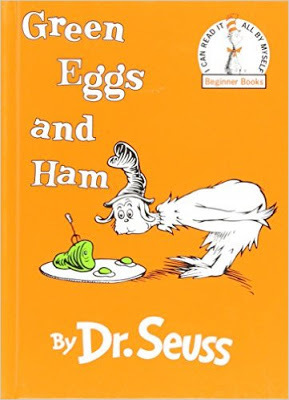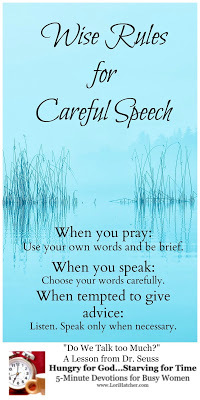Do We Talk too Much? A Lesson from Dr. Seuss
 Green eggs and ham, green eggs and ham. I do not like them, Sam I am.
Green eggs and ham, green eggs and ham. I do not like them, Sam I am.
Best known for his classic children’s books, Theodor Geisel Seuss perfected the art of succinct communication. The Cat in the Hat, the early reader that turned Dick and Jane on their heads, ushered in a whole new era in children’s books.
The New Yorker article, “Cat People – What Dr. Seuss Really Taught Us,” gives us the background on this classic. In May 1954, Life magazine published a report on illiteracy among school children which concluded that children were not learning to read because their books were boring. William Ellsworth Spaulding, the director of the education division at Houghton Mifflin, compiled a list of 348 words he felt were important for first-graders to recognize. He asked Seuss to cut the list to 250 words and write a book using only those words. Spaulding challenged him to “bring back a book children can't put down.” Nine months later, Seuss completed The Cat in the Hat, using 236 of the words.
But Seuss didn’t stop there. When Bennett Cerf, the co-founder of Random House, bet him he couldn’t write a book with 50 or fewer distinct words, he won the bet by producing one of his most popular works, Green Eggs and Ham, using exactly 50 unique words. Green Eggs and Ham went on to be Geisel’s best-selling work, so even though he never collected on the bet, his endeavor paid off royally.
We could learn a lot from Dr. Seuss’s example. And from the Bible. Did you know that Scripture embraces the concept of communicating with an economy of words? It gives us very clear instructions against using “a multitude” of words when a few will do. Here are three principles we can apply to the judicious use of speech:
 1. When we pray, our prayers should be heart-felt, original, and to the point. Matthew 6:7 instructs us, “And when you pray, do not keep on babbling like pagans, for they think they will be heard because of their many words.” While scripted prayers can serve as a guide, God is most interested in our words expressing the thoughts and desires of our heart.
1. When we pray, our prayers should be heart-felt, original, and to the point. Matthew 6:7 instructs us, “And when you pray, do not keep on babbling like pagans, for they think they will be heard because of their many words.” While scripted prayers can serve as a guide, God is most interested in our words expressing the thoughts and desires of our heart. 2. The surest way to sin with our mouth is to open it. Proverbs 10:19 says, “When words are many, sin is not absent, but he who holds his tongue is wise.” Sometimes the best thing we can say is nothing.
3. We can gain a reputation for wisdom by listening, not speaking. If you’re like me, you’re quick to offer an opinion, share information, or propose a solution to someone else’s problem. Proverbs 17:28, however, suggests the opposite. Instead of blurting out the first thought that comes to our mind, we (and others) would be better served if we listened, weighed our words carefully, and sometimes chose not to speak at all. “Even a fool is thought wise if he keeps silent, and discerning if he holds his tongue.”
As a writer, I’d love to be known for the ability to communicate truth with nary a wasted word. As a Christian, I want to pray earnestly, know when to speak, and know when to be silent. These are noble goals – ones I think honor the Lord.
Now it’s your turn. How do you most often get into trouble? By speaking too much or speaking too little? What are your favorite Bible verses on the subject of words? And while you’re commenting, what is your favorite Dr. Seuss book? Leave a comment below and share your thoughts.
If you enjoyed this post, why not subscribe? I'll send you twice-weekly 5-minute devotions to help nourish your soul.
Because women need to connect with God in the craziness of life.
Enter your email address and VALIDATE the Feedburner email sent to your inbox.
Delivered by FeedBurner
If this post was meaningful to you, would you consider sharing it with a friend by clicking on one of the buttons below? Did you know you can receive bi-weekly Hungry for God posts sent directly to your email inbox? Visit http://www.lori-benotweary.blogspot.com and click on the link in the right hand corner to Subscribe Via Email.
Copyright 2012 by Lori Hatcher
Published on September 03, 2017 18:38
No comments have been added yet.
Refresh Blog
A place to refresh your faith, hope, and prayers with 5-minute weekly posts.
- Lori Hatcher's profile
- 101 followers



